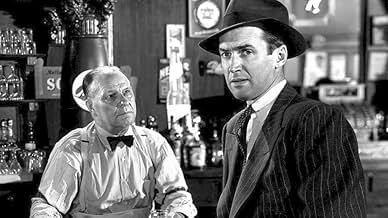Ajouter une intrigue dans votre langueChicago reporter P.J. McNeal re-opens a decade-old murder case.Chicago reporter P.J. McNeal re-opens a decade-old murder case.Chicago reporter P.J. McNeal re-opens a decade-old murder case.
- Prix
- 1 victoire et 2 nominations au total
- Helen Wiecek
- (as Joanne de Bergh)
- Taxicab Driver
- (uncredited)
- Warden of Stateville Prison
- (uncredited)
- Police Photographic Technician
- (uncredited)
- Jan Gruska
- (uncredited)
- Narrator
- (voice)
- (uncredited)
- Secretary
- (uncredited)
Histoire
Le saviez-vous
- AnecdotesThe man administering the polygraph test to convict Richard Conte was the inventor of the polygraph or lie detector machine, Leonarde Keeler. He played himself in the movie.
- GaffesThere was enough of the newspaper showing by the newspaper boy to identify the issue date without seeing the date due to the images shown below the headlines. They just needed to match the pictures in the newspaper held in the background to a newspaper from the same date and see if the photographs match.
Look at the example from the photographs for the film (slide 93 of 118). There is enough to compare newspapers.
- Citations
[McNeal is trying to get Zaleska to name his real partner in the crime and get a chance at parole]
P.J. McNeal: What have you got to lose? You're in for life now. C'mon, tell us the truth.
Tomek Zaleska: Sure, I could say I did it. Then maybe have a chance of getting out, like you say. But if I confessed, who would I name as my partner, Joe Doakes? I couldn't make it stick for one minute. That's the trouble with being innocent. You don't know what really happened. I didn't do it. Me and Frank had nothin' to do with it.
- Générique farfeluOpening credits are printed on the pages of a book; it is also stated that this is a true story.
- ConnexionsEdited from In Old Chicago (1938)
- Bandes originalesChicago (That Toddlin' Town)
(1922) (uncredited)
Music by Fred Fisher
Played during the Prohibition montage
Filmed in semi-documentary style by director Henry Hathaway, this James Stewart led noir thriller oozes realism from start to finish. It's actually the lack of gloss and glamour that is the film's trump card. Based on the real story of the Joe Majczek case in 1933, it's filmed perfectly on location in Chicago {where the actual events happened}, gloriously mood emphasised by Joe MacDonald's superb black & white cinematography, and scored with tonal adroitness by Alfred Newman. As intrepid Chicago Times reporter McNeal {based on real reporter Jim McGuire who was a Pulitzer Prize winner for his investigative efforts on this case}, James Stewart lays down a marker for the more edgier character roles that would follow for him in the 50s. Here he plays it perfect as McNeal shifts from mere cynical newsman to an outright crusader of justice; and it's riding along with McNeal that this human interest piece lifts itself to great crime thriller heights. Along the way we find problems are encountered and police procedural techniques are scrutinised. All may not be as it first seemed, and this mysterious element ices what was already a delightful docu-drama based cake.
There is not much else to say, it's a film I personally highly recommend, a fascinating story that is given top care and attention from all involved, mean, moody and yes, magnificent. 8/10
- hitchcockthelegend
- 17 mai 2008
- Lien permanent
Meilleurs choix
Détails
- Date de sortie
- Pays d’origine
- Sites officiels
- Langues
- Aussi connu sous le nom de
- Calling Northside 777
- Lieux de tournage
- Stateville Correctional Center - 16830 South Broadway Street, Joliet, Illinois, États-Unis(Illinois State Penitentiary: panopticon & cells interiors; entrance exteriors)
- société de production
- Consultez plus de crédits d'entreprise sur IMDbPro
- Durée1 heure 52 minutes
- Couleur
- Rapport de forme
- 1.33 : 1
Contribuer à cette page




































